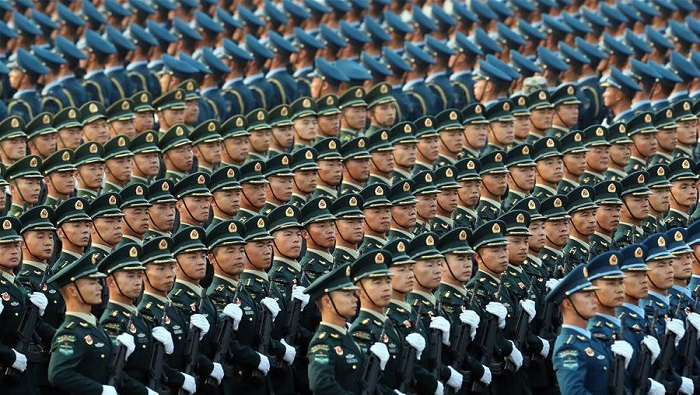
Beijing: China has celebrated 70 years of Communist party rule and its rise to global superpower status with a military parade in Beijing showcasing the country’s latest technology, and a promise from President Xi Jinping that “no force can shake the foundation of this great nation”.
But protests in Hong Kong looked set to cast a long shadow over Beijing’s carefully-choreographed projection of national unity.
China’s leadership past and present gathered on a viewing platform over Tiananmen Square on Tuesday to watch the military parade of 15,000 troops and weapons including new hypersonic drones and ballistic missiles that can reach the United States.
It was followed by a civilian parade, featuring tributes to national icons from founding leader Mao Zedong and the bicycles China was known for before it became an economic juggernaut, to the cities that have sprung up since the reforms of the 1980s.
Xi who has spent years consolidating his grip on power to become perhaps the most influential leader since Mao himself, launched the celebrations with a speech that underlined China’s economic rise and the party’s role in fostering it.
“There is no force that can shake the foundation of this great nation. No force can stop the Chinese people and the Chinese nation forging ahead,” he said.
“China’s yesterday has been written into history, China’s tomorrow will be even better. Our whole party will endeavour to unite and not forget our mission,” he said.
The march-past began with helicopters flying overhead carrying the communist party, state and military flags; the order offering a further hint at the Chinese leadership’s priorities.
For the party, this is one of the most consequential national day celebrations. The state it controls has now outlived the Soviet Union that was once its sponsor and supporter; Chinese officials for years have studied the collapse of the USSR in a bid to avoid a similar fate for the People’s Republic of China (PRC).
But the anniversary also comes as Beijing faces perhaps its most serious challenges since the 40th national day in 1989. That was marked in muted fashion just months after the military killed thousands of pro-democracy protesters in and around Tiananmen square, plunging the country into international isolation.
Today a trade war with the US threatens both the American and Chinese economies, there is growing international unease at Xi’s aggressive projection of power beyond China’s borders, and domestic problems belie attempts to unite China’s 1.4 billion people around the president’s vision of a ‘Chinese Dream’.
In addition to unrest in Hong Kong, and growing support for anti-Beijing politicians in Taiwan – the self-ruled island China claims as part of its territory – there has been growing international concern about the detention of over a million people in far Western Xinjiang region.
Xi in his speech emphasised the “joy and happiness” of “all ethnic groups in China” about the anniversary celebrations, and promised to “maintain the long-term prosperity and stability of Hong Kong and Macau.
“[We must] advance the peaceful development of cross-state relations and continue to strive for the complete reunification of our country.”
Months of protests in Hong Kong have shown that not all Chinese citizens support the direction in which the communist party is taking the country, however, effectively offering economic prosperity without political freedoms.
Activist Joshua Wong on Twitter called for international support for protests in Hong Kong, which were denied a police permit but are expected to go ahead anyway. “No celebration, only demonstration”, he said, warning that China was using Hong Kong to “wave its claws at the free world to step up its oppression.”
In Beijing, Chinese authorities had left nothing to chance in their meticulous planning for the biggest national anniversary since Xi came to power.
The capital was put on lockdown, with bans on everything from kites and homing pigeons to drones. People who live along the parade route have lived with curfews all week, and were asked to leave their homes ahead of national day.
Xi hewed to tradition, wearing a grey Mao suit and inspecting troops from a Chinese-made Red Flag limousine. He watched the parade from the same spot where Mao stood to announce the establishment of the PRC on October 1, 1949.
Then China was so poor and battered by civil war that some of its 17 war planes were reportedly ordered to fly by twice, to make the airforce seem larger than it was.
To prevent anything marring the special day, there has also been a fierce crackdown among those who criticise the government.
Normally outspoken activists and critics have been ordered not to speak to foreign media. Some, who have expressed support for the Hong Kong protests, have had to promise they won’t travel to the city until well after the anniversary.
In Hong Kong, official celebrations were muted, including a morning flag raising ceremony closed to the public, with guests and dignitaries watching from a live broadcast inside a conference centre, where a reception was held afterwards.
Chief executive Carrie Lam was in Beijing, one of the very few senior women watching the parade from the VIP platform overlooking Tiananmen square.
A small group of demonstrators gathered outside the conference centre with a banner saying “There is no national celebration, only national mourning. End one party rule”.
Larger protests linked to the city’s nearly four-month old movement were expected in the afternoon. At least eleven of Hong Kong’s metro stations were closed to prevent people gathering along protest routes, and across the city many shopping centres will shut to avoid becoming battlegrounds.
Police arrested a number of people ahead of the protests on suspicion of conspiracy to make offensive weapons, Radio Television Hong Kong (RTHK) reported.